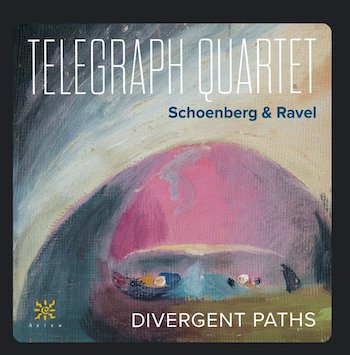Classical Album Review: Telegraph Quartet’s “Divergent Paths”
By Jonathan Blumhofer
A charming rendition of the Ravel string quartet serves as a perfect foil to the rigors of the Schoenberg, which, tough nut though it remains, here gets just the sort of devoted advocacy it requires.

It’s hard to imagine two composers more dissimilar in personality or musical style than Maurice Ravel and Arnold Schoenberg. Yet the two were nearly exact contemporaries (the dour German was six months older) and several of their pivotal works emerged in close chronological order. A pair of those – Ravel’s String Quartet in F and Schoenberg’s String Quartet No. 1 – are paired together on the Telegraph Quartet’s new album,
No question about it: they’re a strongly contrasting set. Ravel’s effort (completed in 1903) is the model of textural, thematic, and structural clarity. It wears its virtuosity – not to mention its dazzling play of instrumental colors – lightly and never loses touch with the songful character of its opening melody.
Schoenberg’s is likewise full of technical and expressive demands. But the score, which he finished in 1905, is also roiling, dense, and as closely wrought as the knottiest post-tonal music on which the composer’s reputation, for better or worse, rests. No less a champion of new music that Gustav Mahler was thrown for a loss by it. And, though Mahler vocally defended the piece from a hostile audience at its Vienna premiere, his verdict remains understandable.
From the start, the piece seethes: it’s full of turbulent, explosive energy and the intellectual level of Schoenberg’s manipulation of motivic fragments is exceedingly high (at least he never seems to be at a loss for where the music should go next). Periodically, the writing grounds itself in the quasi-familiar, like the weirdly charming, archaic-sounding phrases of the second movement or the textural echoes of Verklärte Nacht in the third.
More often, though, other things stand out. On the credit side, one is struck by the vigor of Schoenberg’s counterpoint, the freedom of the Quartet’s play of sonority, and the anticipations of Bartók’s quartets that emerge in some of its gestures and harmonies. At the same time, one wishes that more of the abundant musical ideas on offer stuck in the ear. Also, that the form, with its seemingly endless thematic development, felt less like the bloated Pelleas und Melisande and more focused like, actually, Pierrot lunaire.
Regardless, the Telegraph’s performance and recording of the piece is top-notch. Theirs is a reading that doesn’t once lack for purpose, momentum, or color. Throughout, the group demonstrates both a winning unanimity of articulations and close attention to issues of dynamics. The last results in some strangely terraced balances in the first movement – but that’s exactly what Schoenberg wrote.
For musical feeling, too, they demonstrate an attractive comfortability with Schoenberg’s larger style. When the moment calls for it, there’s a visceral spunk to their playing and the finale’s transformation of the opening theme is radiant as can be.
A number of these qualities also emerge in their account of the Ravel. The dynamic range is impressively broad, lines are often effortlessly dovetailed, and there’s a great sense of atmosphere and character across all four movements.
Granted, sometimes one also encounters a bit of confusion between foreground and background parts; as a result, the melodic line periodically gets a touch lost in the outer movements. And there’s an unaccountably scratchy transition into the second movement’s concluding “Assez vif” section.
Otherwise, this is charming Ravel – and it serves as a perfect foil to the rigors of the Schoenberg, which, tough nut though it remains, here gets just the sort of devoted advocacy it requires.
Jonathan Blumhofer is a composer and violist who has been active in the greater Boston area since 2004. His music has received numerous awards and been performed by various ensembles, including the American Composers Orchestra, Kiev Philharmonic, Camerata Chicago, Xanthos Ensemble, and Juventas New Music Group. Since receiving his doctorate from Boston University in 2010, Jon has taught at Clark University, Worcester Polytechnic Institute, and online for the University of Phoenix, in addition to writing music criticism for the Worcester Telegram & Gazette.
